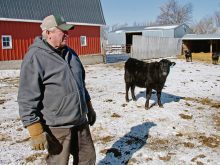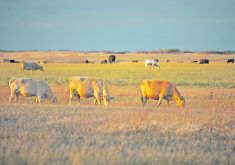Glacier FarmMedia – Rural crime again topped the agenda for Keystone Agricultural Producers after recent headlines returned the simmering issue to the limelight.
Rural crime was among the top priorities for Manitoba’s general farm group during the last provincial election.
Last month, news broke about an incident in the RM of Russell-Binscarth, in which a bison hunt was held on a local farmer’s land without his knowledge. Several of the rancher’s bison were killed and a Portage la Prairie man was charged in connection with the incident.
Read Also

New coal mine proposal met with old concerns
A smaller version of the previously rejected Grassy Mountain coal mine project in Crowsnest Pass is back on the table, and the Livingstone Landowners Group continues to voice concerns about the environmental risks.
The case led KAP to add legal experts to the agenda during its annual round of district meetings.
On Nov. 14 in Selkirk, Katharyn Burczynski, a criminal lawyer with Myers LLP, was that expert. She spoke to members about landowner rights and property protection. One of her first notes addressed how Canadian law differs from landowner rights in the U.S.
“In Canada, you have the right to protect your property, but property will never supersede individual human rights,” she said. “For example, if you’re a licensed firearm holder, don’t be thinking that you can go waving your gun and chasing somebody off your property. That is an absolute no.”
Canada has strict rules when it comes to weapons and guns, she noted, and careless discharge of a firearm could result in prison time.
Trespassing rules are simple; people are not allowed to enter your property without your permission. But whether a situation is considered civil or criminal trespassing could elicit significantly different responses from police.
“Somebody just walking across your property is very unlikely to result in criminal charges,” said Burczynski. “Typically, in order for the police to lay charges, they want to see some sort of harm done to you.”
That means the victim should be as descriptive as possible about the incident when calling police.
“Don’t just say, ‘somebody is on my property.’ Say, ‘I have a concern about vandalism,’ or that ‘they’re scouting out my equipment,’” said Burczynski. “Be as descriptive as possible and voice your concerns.”
Police will assess whether a call seems to be a civil or criminal matter. If they view it as a civil matter, they will be less likely to respond.
“Voice those aspects very clearly,” the lawyer advised. “Explain that there’s been a series of break-ins to different farms in the area. Elaborate, so that they take it a little bit more seriously in a criminal context.”
Burczynski also recommended putting up signs. When a call comes in regarding trespassing, police will commonly ask whether the property owner had signs posted. Signs aren’t mandatory, she said, but police will want to determine if the incursion on the land was accidental.
Installing motion-activated cameras at sensitive points around the property can provide an extra level of protection.
“The police will tend to take things more seriously because you potentially have evidence to back up a complaint,” she said.


















